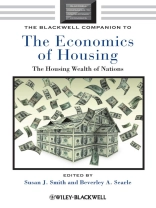The Blackwell Companion to the Economics of Housing will help students and professionals alike to explore key elements of the housing economy: home prices, housing wealth, mortgage debt, and financial risk.
* Features 24 original essays, including an editorial introduction and three section overviews
* Includes 39 world-class authors from a mix of educational and financial organizations in the UK, Europe, Australia, and North America
* Broadly-based, scholarly, and accessible, serving students and professionals who wish to understand how today’s housing economy works
* Profiles the role and relevance of housing wealth; the mismanagement of mortgage debt; and the pitfalls and potential of hedging housing risk
* Key topics include: the housing price bubble and crash; the subprime mortgage crisis in the US and its aftermath; the links between housing wealth, the macroeconomy, and the welfare of home-occupiers; the mitigation of credit and housing investment risks
* Specific case studies help to illustrate concepts, along with new data sets and analyses to illustrate empirical points
Mục lục
Chapter 1: Introduction (Susan J. Smith, Beverley A. Searle, and
Gareth D. Powells).
Part One: Banking on Housing.
Introduction (Editors).
Chapter 2: Housing and Mortgage markets: An OECD perspective
(Nathalie Girouard).
Chapter 3: Is Housing Wealth an ‘ATM’?:
International Trends (Vladimir Kluyev and Paul Mills).
Chapter 4: Housing Wealth Effects and Course of the US
Economy: Theory, Evidence, and Policy Implications (Eric S.
Belsky).
Chapter 5: The rise in house prices and household debt in the
United Kingdom: potential causes and implications (Matt Waldron and
Fabrizio Zampolli).
Chapter 6: Housing Wealth and Mortgage Debt in Australia (Mike
Berry).
Chapter 7: A Survey of Housing Equity Withdrawal and Injection
in Australia (Carl Schwartz, Tim Hampton, Christine Lewis and David
Norman).
Chapter 8: What do we know about equity withdrawal by households
in New Zealand? (Mark Smith).
Chapter 9: What happened to the housing system? (Duncan
Maclennan).
Part Two: Housing Wealth as a Financial Buffer.
Introduction (Editors).
Chapter 10: Trading on housing wealth: political risk in an
ageing society (Mike Berry and Tony Dalton).
Chapter 11: Housing Equity Withdrawal and Retirement: Evidence
from the Household, Income and Labour Dynamics in Australia Survey
(HILDA) (Gavin Wood and Christian A. Nygaard).
Chapter 12: Housing Markets, Wealth and
‘Self-Insurance’ in Spain (Joan Costa-Font, Joan Gill
and Oscar Mascarilla).
Chapter 13: Housing wealth: a safety net of last resort?
Findings from a European study (Deborah Quilgars and Anwen
Jones).
Chapter 14: ‘Pots of gold’: Housing wealth and economic
wellbeing in Australia (Val Colic-Peisker, Guy Johnson and Susan J.
Smith).
Chapter 15: Housing Wealth as Insurance: Insights from the
UK (Beverley A Searle and Susan J Smith).
Chapter 16: Housing to manage debt and family care in the USA
(Helen Jarvis).
Chapter 17: The Subprime State of Race (Elvin K. Wyly).
Chapter 18: The Housing Finance Revolution (Richard Green and
Susan Wachter).
Part Three: Mitigating Housing Risk.
Introduction (Editors).
Chapter 19: How Housing Busts End: House Prices, User Cost and
Rigidities During Down Cycles (Karl E. Case and John M.
Quigley).
Chapter 20: Is there a Role for Shared Equity Products in
Twenty-First Century Housing? Experience in Australia and the UK
(Christine Whitehead, and Judith Yates).
Chapter 21: Trading on house price risk: Index derivatives
and home equity insurance (Peter Englund).
Chapter 22: Hedging Housing Risk: A Financial Markets
Perspective (Jonathan Reiss, John Blank, Peter Sceats, John Edwards
with Susan J Smith).
Creating housing futures: a view from the market (Jonathan
Reiss).
Residential property derivatives: exchange-traded futures and
options (John Blank).
Residential Property Derivatives: The role and relevance of
over-the-counter trading (Peter Sceats).
An interim Solution (John Edwards).
Chapter 23: Hedging Housing Risk: Is it Feasible? (Steve Swidler
and Harris Hollans).
Chapter 24: Housing Risk and Property Derivatives: the Role of
Financial Engineering (Juerg Syz).
Chapter 25: Housing Futures: A role for derivatives? (Susan J.
Smith).
Giới thiệu về tác giả
Susan J. Smith is Mistress of Girton College Cambridge. She
was previously Professor of Geography and a Director of the
Institute of Advanced Study at Durham University. She is a graduate
of Oxford University (MA, DPhil), a Fellow of the British Academy
and of the Royal Society of Edinburgh, an Academician of the
Academy of Social Sciences and a member of the Society of Authors.
Professor Smith has published over 100 scholarly papers covering
topics that range from residential segregation to health
discrimination, from mortgage equity withdrawal to spread-betting
on home price dynamics. Her books include Housing & Social
Policy (1990), Housing for Health (2000), The
Politics of Race and Residence (1989), and Children at
Risk (1995). She is Editor-in-chief of the forthcoming
International Encyclopedia of Housing and Home (2012) and
has written a variety of press articles on home prices and housing
markets.
Beverley A. Searle is a Lecturer in Human Geography at
Durham University. She gained a Ph D in 2005 from the University of
York. Her research interest focuses on housing wealth and
households’ welfare and well-being. She is author of Well-being:
In Search of a Good Life? (2008).












